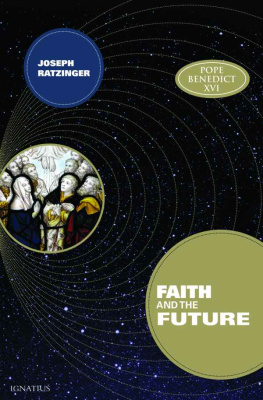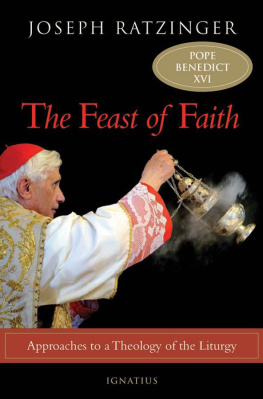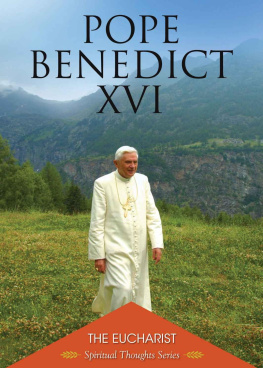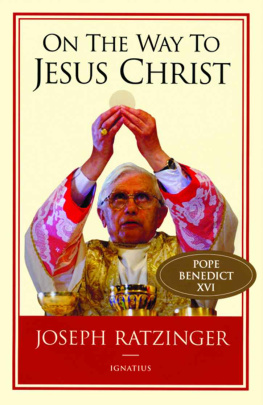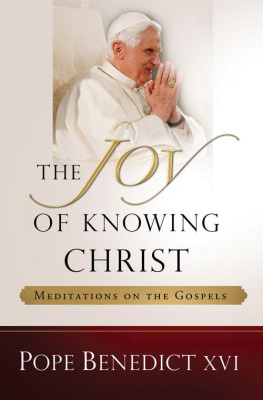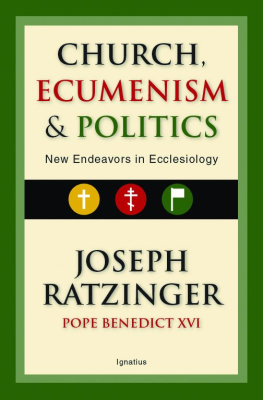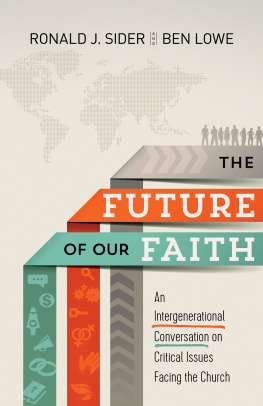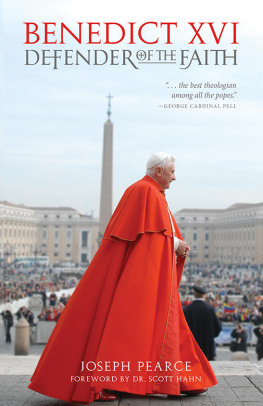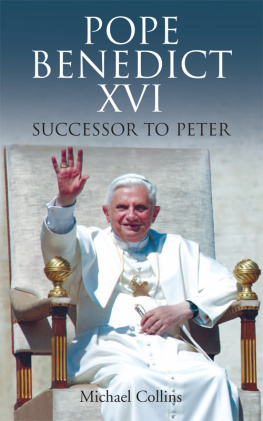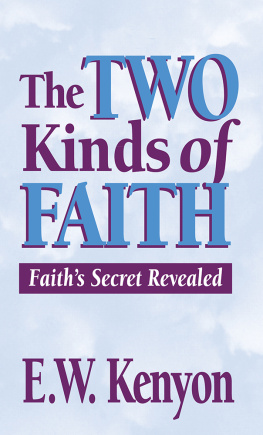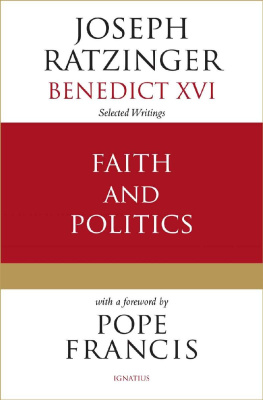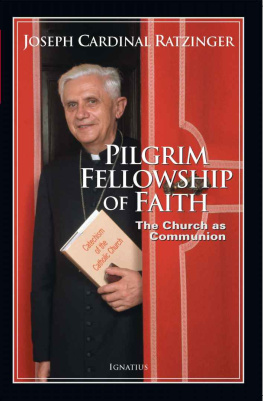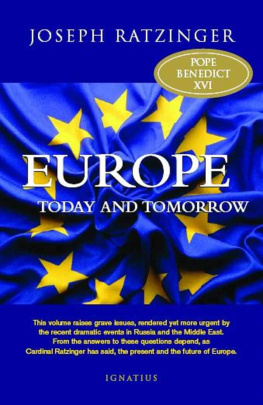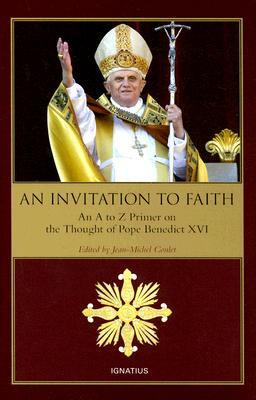FAITH AND THE FUTURE
JOSEPH CARDINAL RATZINGER
(POPE BENEDICT XVI)
Faith and the Future
IGNATIUS PRESS SAN FRANCISCO
Original German edition:
Glaube und Zukunft
2006 by Libreria Editrice Vaticana, Vatican City
1970 by Ksel-Verlag, Mnchen, ein Unternehmen
der Verlagsgruppe Random House GmbH
Original English edition published by
Franciscan Herald Press
1971 by Franciscan Herald Press
Published with ecclesiastical approval, 1971
Reprinted by permission of the
Center for Faith Development & Spirituality
at Quincy University
Cover art: Detail from stained glass window
Lady Chapel, Sidney Sussex College
Cambridge, U.K.
Photograph by Br. Lawrence Lew, O.P.
Cover design by John Herreid
Published by Ignatius Press, San Francisco, 2009
ISBN 978-1-58617-219-0
Library of Congress Control Number 2008934739
Printed in the United States of America
For Professor Johann Baptist Auer
on his sixtieth birthday
About This Book
Increasingly, the future is becoming a theme for theological reflection. In the background we can detect a growing concern for the future of faith. Does faith have any future at all, and, if so, where in all the confusion of todays trends will we discover its embryo? But the problem of the future assails not only the believer. In the ever more rapidly advancing process of historical evolution man is confronted with enormous opportunities, but also with colossal perils. For him, the future is not only hope, but sorrowa nightmare, indeed. He cannot avoid asking what part faith can play in building tomorrows world. The author approaches this problem from a variety of angles, and finishes off with a sketch of the future of the Church.
Contents
Preface
The five chapters of this hook were first presented as radio addresses. The first three were broadcast in the special program of the Bavarian Rundfunk during December 1969, the fourth on Vatican Radio in February 1970, and the fifth by the Hessian Rundfunk at Christmas 1969. As it happened, all five addresses centered round the same theme: the problem of faith and the future. The fact that this problem emerges on every side today indicates how faith is being shaken to its foundation by the crisis of the present and also how great is the fascination of the future in a period when we witness history being set unusually in motion and see human possibilities beginning to develop, positively and negatively, along roads that lead we know not where. And so, the reflections in this little book cannot be considered as final. They are presented merely as attempts at opening up, at indicating where the embryonic future is to be detectedand that is within faith, provided faith remains true to itself.
Joseph Ratzinger
Regensburg
Spring 1970
Faith and Knowledge
Over a hundred years ago the French philosopher and sociologist Auguste Comte distinguished three phases in the historical evolution human thought: the theological-fictive; the metaphysical-abstract; the positive. Gradually the positivist form of thinking would come to be applied to all departments of reality. Finally even the most complicated and least comprehensible department, the ultimate, longest defended citadel of theology, would be successfully subjected to positivist scientific analysis and exposition. Moral phenomena and man himselfhis essential human naturewould become subject matter for the positive sciences. Here, too, the mystery of the theologians would little by little have to lose ground to the advance of positivist thinking. In the end, it would be possible to develop even a social physics, no less exact than the physics that charts the inanimate world. In the process, the realm of the priest would ultimately vanish, and questions about the nature of reality would be handed over totally to the competence of scholars. In the wake of this development, the question about Gods existence would of necessity become obsolete, discarded and left behind by mans mind as quite simply meaningless. Just as today it never occurs to anyone to deny the existence of the Homeric gods, because the question about their existence is not even taken seriously, so when thinking had finally assumed the positivist form, the question about the existence of God of itself ceased to exist. For this reason Comte was spared the excitement a war against God, such as other great atheists before and after his day have waged with the utmost passion. Comte simply strode calmly on toward the post-theistic age. Moreover, in his late period he applied himself at great length to the task of drafting a new religion for mankind, for although, as he affirmed, man can live without God, he cannot live without religion.
It seems incontrovertible that today the mentality described by Comte is that of a very large section of human society. The question about God no longer finds any place in human thought. To take up a well-known saying Laplace, the context of the world is self-contained, and the hypothesis of God is no longer necessary for its comprehension. Even the faithful, like travelers on a sinking ship, are becoming widely affected by an uneasy feeling: they are asking if the Christian faith has any future, or if it is not, in fact, more and more obviously being made obsolete by intellectual evolution. Behind such notions is the sense that a great gulf is developing between the world of faith and the world of science, a gulf that seems unbridgeable, so that faith is made very largely impracticable.
Let us take a look at the general picture and see where the critical points are to be found. The difficulty begins with the very first page of the Bible. The concept presented there of how the world came to be is in direct contradiction of all that we know today about the origins the universe; and even if the word has got around that these passages in the Bible are not meant to be a textbook of natural science and so need not be taken as a literal description how the universe came to be, still, an uneasy feeling remains: the fear that this explanation is a retrospective evasion, unsupported by the original texts themselves. And the problem continues, almost page by page, as we read on through the Bible. There is the clay, molded into a man by the hand of God, and then, close upon it, the picture of woman formed out of the side of the sleeping man, flesh of his flesh and companion to comfort his loneliness. Today we may be learning how to reappraise this imagery as a profoundly symbolic utterance about human nature, as pictures whose truth lies on a plane totally different from that upon which biology and the theory of descent operate. We may now see these pictures as indeed expressing truth, but a truth that is deeper and more concerned with mans essential humanity than are the truths of natural science, exact and important as the latter may be. This may well be, but in the very next chapter new problems emerge with the story of the Fall. How can one bring this into harmony with the knowledge that, on the evidence of natural science, man starts, not from above, but from below, does not fall, but slowly rises, even now having only just accomplished the metamorphosis from animal to human being? And what of paradise? Long before man existed, pain and death were in the world. Thistles and thorns grew long before any man had set eyes on them. And another thing: the first man was scarcely self-conscious, knew only privation and the wearisome struggle to survive. He was far from possessing the full endowment of reason, which the old doctrine of paradise attributes to him. But once the picture of paradise and the Fall has been broken in pieces, the notion of original sin goes with it, to be followed logically, it would seem, by the notion of redemption as well.

